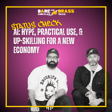
What’s Really Plaguing SOC Teams, Lessons for Vendors & Leaders
Erik Bloch, security operations expert and longtime infosec leader, joins the show to talk about the real problems plaguing SOCs and why the industry keeps missing the mark!
George K and George A talk to Erik about:
- The massive disconnect between what vendors think SOCs do vs. reality - spoiler alert: most founders have never worked in the trenches
- Why we're still fighting the same problems from 20 years ago - false positives aren't even 10% of the actual work, so why do we keep obsessing over them?
- The real burnout formula: high responsibility + low control + endless busywork that has nothing to do with catching bad guys
- Business alignment that actually works: Stop talking about theoretical $48 bazillion losses and start tying security outcomes to actual business growth
Whether you're a vendor or an executive leader, there's gold -- and data! -- in this episode. The "AI will solve everything" narrative is misleading, hear what actually works in security operations!
------------
🏳️🌈 It's PRIDE month! ALL PROFITS from all sales of the Pride collection during the month of June will be donated to scholarships for LGBTQ+ students in cybersecurity.
And this year we have generous vendor sponsors who will match our donation!
Shop swag, help students. You can shop the collection here: https://bkbtpodcast.shop/collections/pride-in-cyber



















